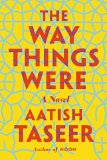
Critics' Opinion:
Readers' rating:
Published Jul 2015
576 pages
Genre: Historical Fiction
Publication Information
The Way Things Were opens with the death of Toby, the Maharaja of Kalasuryaketu, a Sanskritist who has not set foot in India for two decades. It falls to his son, Skanda, to return Toby's body to his birthplace, "a tin-pot kingdom" not worth "one air-gun salute." This journey takes him halfway around the world and returns him to his family, the drawing-room elite of Delhi, whose narcissism and infighting he has worked hard to escape. It also forces him to reckon with his parents' marriage, a turbulent love affair that began in passion but ended in pain and futility.
Aatish Taseer's The Way Things Were takes its title from the Sanskrit word for history, itihasa, whose literal translation is "the way things indeed were." It is both an intimate portrait of a family and a panoramic vision of the last half century of life in Delhi, with Sanskrit woven in as central metaphor and chorus. Through one man's struggle with his inheritance, it explores the cultural schizophrenia of modern India and the difficult of building honestly on the past.
"Starred Review. Taseer's book is a cut above the rest. Colonialism, racism, sectarian violence, class tension, and the rise of the Indian nouveau riche are all handled with a delicate touch. This is a difficult book to put down, and readers will enjoy every minute of it, as well as learning about contemporary Indian culture." - Publishers Weekly
"Starred Review. A timeless, masterful epic." - Kirkus
"Taseer, the son of an assassinated Muslim Pakistani politician and a Sikh Indian journalist, is undoubtedly a formidable storyteller (Temple-Goers; Noon), yet his constant, digressive displays of erudition - from Marcel Proust's Swann and Joseph Conrad's Kurtz to neglected vocabulary such as fissiparous and pleonastically - prove more distracting than enhancing. The result is an unnecessarily sprawling, nearly 600-page epic that should have been stunning." - Library Journal
"What [Taseer] has done with great intelligence and elegance is to deliver a novel of ideas in the guise of a very human story." - Financial Times (UK)
"This immense and intense [novel]... is a substantive contribution to new writing from the subcontinent." - The Independent (UK)
" [An] ambitious novel, in which Taseer seeks to reconcile the ancient mysteries of classical Vedic culture with the overcrowded, politico-religious minefield of modern India." - The Guardian (UK)
"In delving beneath the surface, he has vividly exposed the quarrels and quandaries of an India undergoing rapid historical and social change." - The Spectator (UK)
This information about The Way Things Were was first featured
in "The BookBrowse Review" - BookBrowse's membership magazine, and in our weekly "Publishing This Week" newsletter. Publication information is for the USA, and (unless stated otherwise) represents the first print edition. The reviews are necessarily limited to those that were available to us ahead of publication. If you are the publisher or author and feel that they do not properly reflect the range of media opinion now available, send us a message with the mainstream reviews that you would like to see added.
Any "Author Information" displayed below reflects the author's biography at the time this particular book was published.
Aatish Taseer was born in 1980. He is the author of the memoir Stranger to History: A Son's Journey Through Islamic Lands and two novels: The Temple-Goers, which was short-listed for the Costa First Novel Award, and the highly acclaimed Noon. His work has been translated into more than a dozen languages. He lives in New Delhi and New York.





The Funeral Cryer by Wenyan Lu
Debut novelist Wenyan Lu brings us this witty yet profound story about one woman's midlife reawakening in contemporary rural China.
Your guide toexceptional books
BookBrowse seeks out and recommends the best in contemporary fiction and nonfiction—books that not only engage and entertain but also deepen our understanding of ourselves and the world around us.